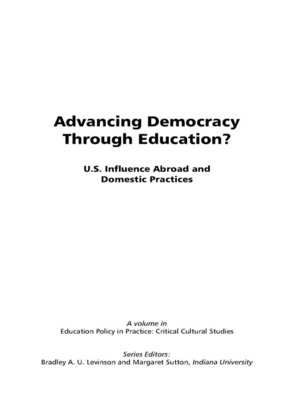Advancing Democracy Through Education?
ebook ∣ U.S. Influence Abroad and Domestic Practices · Education Policy in Practice: Critical Cultural Studies
By Doyle Stevick

Sign up to save your library
With an OverDrive account, you can save your favorite libraries for at-a-glance information about availability. Find out more about OverDrive accounts.
Find this title in Libby, the library reading app by OverDrive.



Search for a digital library with this title
Title found at these libraries:
| Library Name | Distance |
|---|---|
| Loading... |
This book explores the diversity of American roles in such cross-cultural engagement in education for democracy, both within the United States and around the world. Cross-cultural engagement in education for democracy inevitably bears the impressions of each culture involved and the dynamics among them. Even high-priority, well-funded U.S. government programs are neither monolithic nor deterministic in their own right, but are rather reshaped, adapted to their contexts, and appropriated by their partners. These partners are sometimes called recipients, although that label is problematic. "Recipient" both gives a misleading impression that partners are relatively passive in the overall process, and its use is a reflection of some outside donors' or experts' stance that they are delivering goods or expertise. The authors of these chapters pay close attention to the cultures, contexts, structures, people, and processes involved in education for democracy. Woven throughout this volume's qualitative studies are the notions that contacts between powers and cultures are complex and situated, that agency matters, that local meanings play a critical role in the dynamic exchange of peoples and ideas. The authors span an array of fields that concern themselves with understanding languages, cultures, institutions, the close view of daily life, and the broad horizon of the past that shapes the present: history,anthropology, literacy studies, policy analysis, political science, and journalism. Together, these 10 chapters provide a rich sampling of the diverse contexts and ways in which American ideas, practices, and policies of education for democracy are spread, encountered, appropriated, rejected, or embraced around the world. While not meant to provide a complete or systematic overview of the American influence on education for democracy around the world, the volume nevertheless introduces concepts, identifies processes, notes obstacles and challenges, and reveals common themes that can help us to understand American influence on education for democracy more clearly, wherever it occurs.







